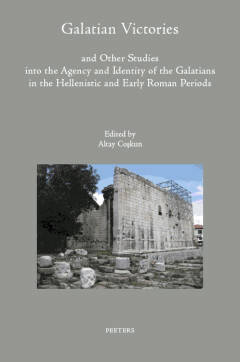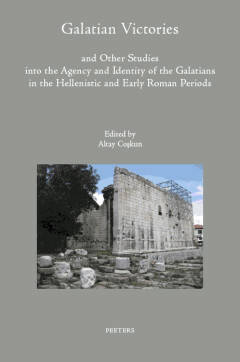
- Afhalen na 1 uur in een winkel met voorraad
- Gratis thuislevering in België vanaf € 30
- Ruim aanbod met 7 miljoen producten
- Afhalen na 1 uur in een winkel met voorraad
- Gratis thuislevering in België vanaf € 30
- Ruim aanbod met 7 miljoen producten
Zoeken
Galatian Victories and Other Studies Into the Agency and Identity of the Galatians in the Hellenistic and Early Roman Periods
Coskun A
€ 95,00
+ 190 punten
Omschrijving
Stephen Mitchell's Anatolia (1993) and Karl Strobel's Die Galater (1996) were by no means end points for the study of Hellenistic and Roman Galatia. Rather, they stimulated several new research initiatives. The introduction to this volume synthesises the results of some 700 mostly very recent scholarly publications, before ten case studies explore new trends in military, political, cultural and religious history. Methodologically refined approaches to the fragmentary literary sources have nuanced our understanding of the Galatians' migration, settlement, state formation, warfare and diplomacy. Investigations into the Galatians as the object of Attalid and Seleukid propaganda are complemented by studies into their political agency as independent tribes with varying objectives. For the Roman period, Greek inscriptions available in constantly growing numbers, besides coinage and other archaeological data, allow for a nuanced understanding of what provincialisation meant in practice: the loss of political autonomy was immediate (25 BC), as was the foundation of colonies in Pisidia; a landscape of monumentalised cities in the heartland of Galatia followed only slowly in the course of the next century. Cultic innovation was also diverse: the temple for the goddess Roma and the god Augustus was constructed in Ankyra from 5 BC to AD 14, whereas traditional Hellenistic-Phrygian cults densely resurface in the epigraphic evidence of the 2nd and 3rd centuries AD. Interest in Paul's evangelisation of Asia Minor has been the catalyst of scholarly interest in the Galatians since the 4th century. Two studies devoted to the historical context of Paul's Letter to the Galatians try to connect the bulk of Pauline scholarship with latest research on urbanisation, ethnic constructs and spatial conceptions in the Graeco-Roman world, to lift discussions to a new level.
Specificaties
Betrokkenen
- Auteur(s):
- Uitgeverij:
Inhoud
- Aantal bladzijden:
- 414
- Taal:
- Engels
- Reeks:
- Reeksnummer:
- nr. 33
Eigenschappen
- Productcode (EAN):
- 9789042946088
- Verschijningsdatum:
- 8/08/2022
- Uitvoering:
- Hardcover
- Formaat:
- Genaaid
- Afmetingen:
- 25 cm
- Gewicht:
- 3987 g

Alleen bij Standaard Boekhandel
+ 190 punten op je klantenkaart van Standaard Boekhandel
Beoordelingen
We publiceren alleen reviews die voldoen aan de voorwaarden voor reviews. Bekijk onze voorwaarden voor reviews.








